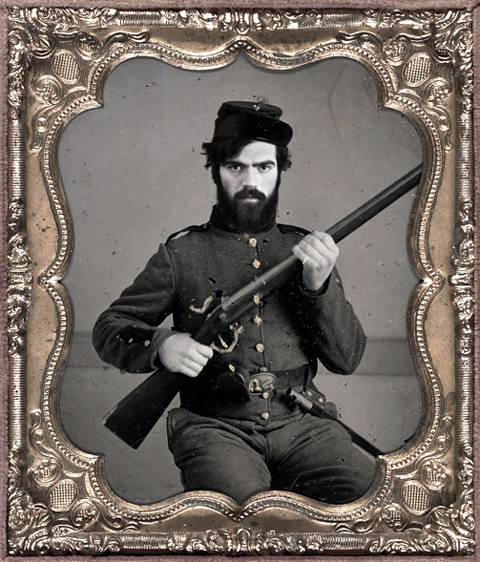Titus Andronicus, a Shakespearean tragedy, is violent, graphic, and considered his most gratuitously bloody work. When it premiered, the amount of death and gore in the last act of the play alone was enough to make even his biggest fans turn away in disgust. The full title of the play is The Lamentable Tragedy of Titus Andronicus, and the whole affair, not just the events within the play, is certainly worth lamenting. Titus Andronicus was the very melodramatic band name chosen by a man named Patrick Stickles, and The Most Lamentable Tragedy is the title of their most recent album. Stickles proclaims each new release by the band to be the last one, and this title is his attempt to make those two ends meet. The implication that he would find his own life’s work lamentable and tragic is not unbefitting, because Stickles is, or can be, that kind of guy. Check our interview with him from 2013.
Titus Andronicus is most easily called a punk rock band. If one were to complicate things, you also could call it the artistic outlet of an intelligent, angry, sensitive and unbalanced person, and this is apt. Stickles has bipolar disorder, a mental illness characterized by mood swings between periods of extreme elevation and depression. It is something that he has always been open about. The Most Lamentable Tragedy is Stickles’ incredibly ambitious effort at a rock opera, and it’s about his struggle with the illness.
Patrick Stickles hails from Glen Rock, New Jersey, and he’s always held on to the dirty pessimism that someone might stereotype a disgruntled New Jersey resident to have. The band’s seminal year was 2005, when Stickles started recording tracks in his parents’ house in between classes at college. Titus Andronicus has a strange kind of eclecticism in their sound: It’s 80’s punk a-la The Replacements meeting fellow New Jersey native Bruce Springsteen, sprinkled with some Irish charm and emo angst. Their 2008 debut album, The Airing of Grievances, was just that. Stickles didn’t spend much time before waxing conceptual, and 2010’s The Monitor is about the Civil War and its particular relation to one man’s life. The opening track, “A More Perfect Union,” starts off the album with words from Abraham Lincoln, and it only gets better from there. This album features themes of war and death just as it does those of friendship and perseverance. The Monitor is Stickles in a full mania up-swing: endlessly productive, relentlessly energetic, thrilled and ecstatic and never apologetic. It contains both blistering punk and swaggering rock guitar sounds that smash into each other in call-and-response fashion. It’s songs that play like persuasive essays – seven-minute anthems that are each a call to arms. The theme of the album, wholeheartedly, is band together and FIGHT! And NEVER RELENT!
And as for the call to arms? Please, let’s FIGHT! But it never becomes quite clear how, what, or why we’re fighting. The album isn’t meant to be a Civil War documentary. And it’s easy to say that the enemy is ourselves, and the battle unwinnable, but The Monitor doesn’t really take us there. It does take us up and down on an exuberantly angst-ridden roller coaster ride through the human experience, though. It’s Titus Andronicus’s master work, and it’s one of the best indie releases in recent history.

This is the brain of Patrick Stickles: full of intricate stories and references and every emotion imaginable in true grandiosity. It’s overflowing, period. The Monitor was highly acclaimed by the appropriate indie music critics for its feeling, if not for its clarity. Following this album, Stickles went into some of his most extreme bipolar-afflicted years. He was trudging through a deeply depressive mire throughout the production of the band’s next release, 2012’s Local Business, which sees the band recede away from the spotlight and focus on more introverted plights. Its sound is purposely rawer and less accessible, and though it gleaned positive reviews, it was decidedly less successful than The Monitor.
Subsequent years saw Stickles swinging back up. Around this time, he let out to the press that the band had a rock opera in the works; an allegorical story consisting of 30 tracks and two hours. These claims were met with facetious grins by some, but fans of the band weren’t completely dismissive. It didn’t come as a total surprise when Stickles made true on his claims, although a few years later. The Most Lamentable Tragedy came out on July 28th, 2015, the musician’s thirtieth birthday. TMLT listens like a musical novel. It is indeed a rock opera, to be precise — consisting of five acts and spanning three albums. As rock operas do, it features the trials and tribulations of a “Hero,” who in this case encounters and wrestles with his “Other” self, or his twin, along the way. TMLT takes us on the journey that was hiding between the lines of The Monitor, and leaves nothing out.

I’d oblige to carefully walk us through this journey, but I can’t. When I first embarked on this article, I entertained the idea of evaluating The Most Lamentable Tragedy through a track-by-track literary interpretation. I abandoned that idea quickly. Not only would it take forever to pick apart and reassemble such an intricate and expansive piece of art, but it’s also already been done — pretty much line for line, in the best fashion possible, by the author of the literature himself. Stickles has a bachelor’s degree in literature, and took to the song lyrics website genius.com to personally annotate, in full, his latest album. So yeah, there’s that.
Instead, I just have a mundane summary and highlights. The Most Lamentable Tragedy is momentous. Sonically, it has those brute force punk body slams that Titus is known and loved for, interspersed with Bowie-influenced rock-and-roll jams and instrumental pauses for reflection. It is truly a sprawling album, 92 minutes long, with all sorts of “ups” and “downs.” The first act sees our Hero come into existence, come into sentience, and fall out of regular sanity — see “I Lost My Mind.” Then our Hero establishes a definition of his own mentality and realizes the dualism, meeting his doppelganger — see “Mr. E. Mann.” Next comes crescendo, and full-force, hit-the-ground-running mania, with the two tracks “Fired Up” and “Dimed Out.” Both are brilliant in that they exemplify symptoms of bipolar mania expertly, but also take a step outside and become generally accessible. These are the album’s key anthems.
After this point, though, the storyline starts to waver a little. There is a long dream sequence, a thinly-spread romance, and then just a general descent into confusion and frustration. There are still some un-skippable highlights: the Salinger-esque “(S)HE SAID/(S)HE SAID,” and “Fatal Flaw.” Unfortunately, though addressed, the foil character to the Hero never becomes totally distinct. But, if we’re going to stay completely within concept here (as Stickles might want), it’s obviously unreasonable to expect a satisfying conclusion to this story, because there is no conclusion — mental illness is a lifelong affliction and battle.
This is how The Most Lamentable Tragedy is brilliant – it’s confusing, sprawling, egotistical, joyous, angry, brooding, and animated, all at the same time. It’s conceptually erratic, so it’s conceptually perfect. Acceptance and understanding of people with mental illnesses has come a long way in society, but it’s not where it should be. Patrick Stickles’ ability to address it, in good times and in bad, is important. His desire to take on such weighty concepts is most admirable, even when the attempt has flaws. This may not be the sole intent of The Most Lamentable Tragedy, but it is an important one. And if that means that the other intentions are mostly to help the listener rock the fuck out, then that makes this a truly great album.
Titus Andronicus releases a new live album, Stadium Rock: Five Nights at the Opera, on July 29th (the day after Stickles turns 31). It’ll be another grand evening at the theatre.
To learn more about bipolar disorder, go here.
Titus Andronicus is playing at The Accord on Sunday, May 15th, with special guests La Sera and The Tomblands. Doors are at 7 p.m. and the show is at 8 p.m. Tickets are $15 in advance, $18 at the door.








